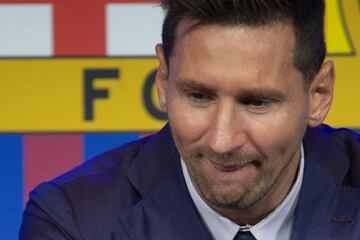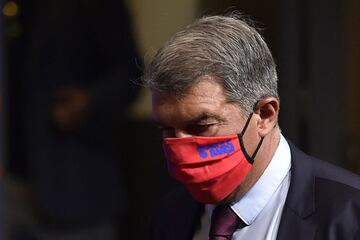On Messi's Barcelona departure and what's wrong with our game
There can be few tears so painfully symbolic of a fiasco with a capital ‘F’ than those shed by Lionel Messi in his farewell to Barcelona. It’s a fiasco for Spanish football, for the club and its directors, for the fans and for the player himself. If a superstar like Messi and a team like Barça, one that describes itself as ‘more than a club’, agree to continue their 21-year love affair but, in the space of just a few hours, everything falls apart to the apparent benefit of a team owned by a sovereign Arab state, something is very, very wrong with our game.
A euro-a-year deal would have been fairy-tale stuff, but...
Abrasha Rotenberg, a highly respected, 95-year-old Argentine writer of Ukrainian origin, the father of the actor Cecilia Roth and the musician Ariel Rot, wondered in AS this week what he would have done if he were Messi and Barça couldn’t afford to keep him because of their dire financial state. He proposed a solution that would certainly have made for a fairy-tale conclusion to Messi’s Camp Nou career: “If I were him, I would sign an indefinite contract at Barça and would set my salary at one euro a year.” In the multi-millionaire world of football today, it would be fanciful, naive, even childish to expect that to happen, but for the football-mad kid in every fan, it’s hard to imagine a better ending to the story that has been Messi and Barcelona. If he had done something like that, Messi would have been beatified by the Barça congregation and, for the rest of the world, would have become a legend beyond compare. This isn’t a fairy tale with a happy ending, though. This is a story about money.

The result is that the new football season is upon us, fans are set to return to stadiums, and yet everything is enveloped in a certain funereal air. In previous years, it’s been all about the excitement of signings, about summer tournaments and tours showcasing LaLiga’s talents. This year, we’re enduring the shock of Messi and Sergio Ramos’ departures; hugely tense conflicts over the Super League and LaLiga’s deal with a private equity firm; and unfortunate episodes that are just depressing for the fans, such as the Florentino Pérez tapes. Had it not been for Spain’s good performance at the European Championship and the Olympics, you could be forgiven for thinking there was a curse on Spanish football. What is going on?
The Messi affair offers more than a few clues as to the dysfunction afflicting Spanish football, and Barça appear to be a paradigm of all its ills. The Catalan club begin the season in a terrible place, still reeling from the Kafkaesque departure of their best player. Barça seemed to copy the script of the secessionist procés as they turned what was heralded as the star’s definitive reconciliation with his boyhood club into a crushing blow for the supporters: a cack-handed promise that proved unfeasible (keeping the Argentine), a good few lies or half-truths about the club’s financial situation, leaders and directors more concerned about their own benefit than that of the organisation as they played with the feelings of the gent blaugrana and, finally, the harsh truth revealed in a pithy press release as they admitted a fat lot of hot air had been expended and there was no room for Barça’s emblematic figure at the club.
After months hearing about Joan Laporta’s sweet dreams about Messi, in just nine lines of text the club closed the book on a 21-year relationship between the forward and his fans. Unbelievable. Laporta won the presidential elections because he was going to succeed in keeping a player who, with his burofax last summer, had expressed his desire to leave the club. For months, he kept people’s hopes up that the 34-year-old would renew his contract, told Barça’s members and fans that everything was going well, that he would sell players, cut wages, that everyone should relax, that he would manage what only he could manage. Because he’s Laporta, the man with the magic wand. And in the end, he turned around and told us it wasn’t that simple, the club is in financial ruins and Barça could not mortgage its future to keep hold of Messi. Laporta, as Ramón Besa wrote in EL PAÍS, is no longer Laporta. He hasn’t fulfilled any of his promises. He tied his future to Messi’s, but when push came to shove he gave him the slip. With the Argentine gone, should Laporta remain as president of the club?

Fans' voices aren't heard in Spain
One of the terrible lessons this story offers us, and there are worse, is to highlight the steady divide that has opened up between clubs and fanbases, which for years now have been relegated to mute bystanders in decision-making, mere spectators in the bitter conflicts between those who govern the sport they love. Unlike other countries such as Germany and the UK, Spanish fans’ voices aren’t heard. German and British clubs would have a hard time making a decision behind their supporters’ backs. Not even those clubs who are owned by a domestic or foreign magnate. People who watch football on television are fans too, of course, but if we really want to attract young people to the game, we need to fill stadiums - when that’s allowed - with happy, respected fans whose opinions are taken into account. If not, we risk ending up with mutiny, as we saw in the UK when the Super League was announced.
Spain's domestic game is hampered by division
You can’t help but feel football is now firmly in the hands of investment funds, of agents like Jorge Mendes and Mino Raiola, and of state-backed clubs. Clubs like Real Madrid and Barcelona have a tougher and tougher task competing with them. LaLiga’s admirable process of modernisation under its president, Javier Tebas, is a good start to it fighting its corner in the theatre of multi-million-euro signings, frenetic media exposure and digital transformation, which is changing the business model. But it will be more effective if it manages to overcome the Spanish game’s grave contradiction: the interests of the biggest clubs (Madrid, Barça, Atlético…) do not line up with those of the smaller clubs, on whom Tebas’ power rests. That’s why some are calling for the Super League and others are fighting it; that’s why some have welcomed the CVC investment fund and others are denouncing it as a scam. Against this backdrop, there’s no way we can move forward healthily.
Like so many activities which must either evolve or disappear, football is enduring (benefiting from) digital disruption. There is no longer any room in football for amateurishness. Today, everything is a fight to the death that too often ends up in court, with uncertain and not always positive results, when what we’re still talking about is a game born on the streets, that is about unbridled passion and joy, and that has marvellous mysteries bound up in it, such as the life and miracles of Messi. The poor relationship between our administrators - a problem the Spanish FA is also a part of - is bad news that for too long has occupied too many front pages. Let’s talk about Pedri, not about Tebas and Luis Rubiales. It seems, though, as if football is beset by that most Spanish of ills, that self-destructive ability to always be divided, regardless of what the issue is, and to be incapable of constructing a common project that’s beneficial to all.
It's now a struggle to name many top LaLiga stars
The conclusion is that, as we wait for the miraculous arrival, if it actually happens, of Kylian Mbappé or Erling Braut Haaland, fans will find themselves struggling to make a list of top talent in Spain’s domestic league. There’s the likes of Luka Modric, Antoine Griezmann and Jan Oblak. There’s the odd discovery here (Youssef En-Nesyri, Jules Koundé…) and the odd exciting prospect there (Pedri, Ansu Fati…). And that’s pretty much it. At the same time, we read that Romelu Lukaku is returning to Chelsea for 115 million euros or that Pep Guardiola’s Manchester City have signed Jack Grealish for 117 million euros.
And as we struggle to list top talent in LaLiga, there are so many unanswered questions, again with Barcelona front and centre: what really happened to see a deal that seemed close to conclusion, the re-signing of Lionel Messi, go up in smoke in a matter of hours, sparking historic levels of turmoil at the Camp Nou? Is the CVC investment fund’s involvement in LaLiga great news for everyone or a “scam”, as Real Madrid claim? Is it true that Laporta first celebrated the CVC deal with Tebas, then changed his tune without batting an eyelid? Is it really LaLiga’s financial-fair-play rules that have caused Messi’s departure, or is it Barça bosses’ desire to start a new era without him? Is a Super League the solution at the elite level or would it spell the end for football below it in the pyramid?
At Barcelona, they’re trying to make a virtue of necessity and are telling anyone who will listen that Messi’s exit had to happen. They say that Ronald Koeman’s first-team project, which involves the embracing of youth and a general reboot of the club’s sporting plan, will bear fruit and will lead to a new, financially-sustainable period of glory. We’ll see. The romantics among us would have liked to keep the likes of Cristiano Ronaldo, Ramos, Raphaël Varane and Messi in LaLiga, and would rather not see so much young talent playing outside of Spain to earn their place in the national team or at a big club. We might even dream of a Rotenberg-esque solution, with Messi playing at his lifelong club for a euro a year. It would be nice, but who’s going to believe that ending?






